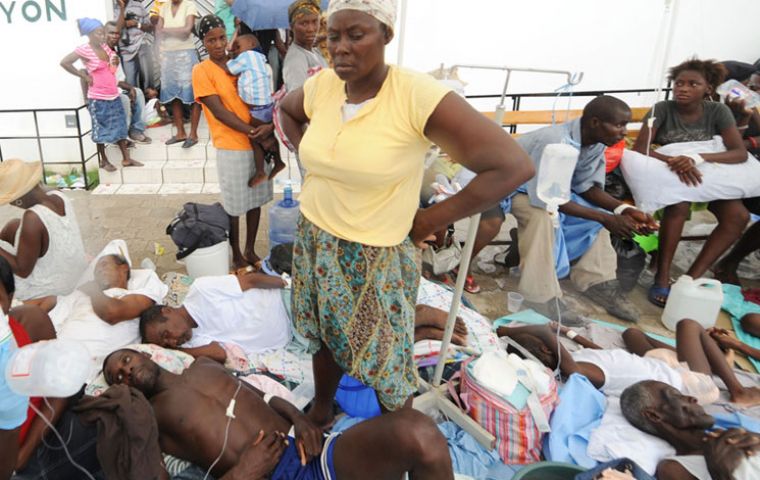MercoPress. South Atlantic News Agency
Haiti: A devastated country in the time of cholera
 Tests conducted by the World Health Organisation confirmed that the type of cholera that hit Haiti is the 01 strain which is the most deadly [AFP
Tests conducted by the World Health Organisation confirmed that the type of cholera that hit Haiti is the 01 strain which is the most deadly [AFP With few signs of recovery nine months after Haiti’s earthquake, the country’s government and its main foreign-aid donors were forced to tout a rather underwhelming achievement—the absence of water-borne diseases like typhoid, diphtheria and cholera—as evidence of progress.
Now, even that claim is beyond their grasp. In the past four days over 250 people have died of cholera in the country, and a handful of victims have shown up in Port-au-Prince, the capital.
This was the situation that humanitarian workers feared most. The capital’s tent cities, numbering over 1,300 and still home to 1.3m people, are veritable Petri dishes for disease. Many lack a consistent supply of clean water. Toilets are smelly and, even in the best-run camps, not de-sludged often enough. Flooding and standing water—literal cesspools—are frequent at this late stage in the rainy season.
Untreated, cholera can kill within hours of the first symptoms. It causes profuse diarrhea, and victims can lose gallons of water per day. The treatment is hardly high-tech—oral rehydration salts, IVs for victims unconscious or too weak to drink, and lots of clean water—but Haiti’s weak health system could not handle an epidemic.
Indeed, the “medical grid” (aid-speak for health-care infrastructure) has already collapsed in St Marc, where the first cases appeared Wednesday. Located 100km north of Port-au-Prince and unaffected by the earthquake, it is one of the main cities in Haiti’s so-called rice basket, the Artibonite Valley—whose eponymous river is where epidemiologists suspect that the outbreak originated. People use the river to bathe, wash clothes and drink.
So far, no cases are known to have originated in Port-au-Prince: the five confirmed victims in the capital appear to have journeyed there to seek care. That’s a sliver of good news. But as goods and people journey through the country, it’s not likely to last.




Top Comments
Disclaimer & comment rulesCommenting for this story is now closed.
If you have a Facebook account, become a fan and comment on our Facebook Page!